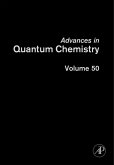Organized into five parts encompassing 16 chapters, this book begins with an overview of how quantum mechanical deductions are made. This text then describes the achievements and limitations of the application of quantum mechanics to chemical problems. Other chapters provide a brief survey of some essential properties of the associated Legendre functions. The final chapter deals with the Franck-Condon principle, which states that transitions tend to occur between vibrational levels of two different electronic states for which either the minimum or maximum values of the internuclear distance in the potential energy diagram occur with the same nuclear configuration.
This book is a valuable resource for chemists.
Dieser Download kann aus rechtlichen Gründen nur mit Rechnungsadresse in A, B, BG, CY, CZ, D, DK, EW, E, FIN, F, GR, HR, H, IRL, I, LT, L, LR, M, NL, PL, P, R, S, SLO, SK ausgeliefert werden.









